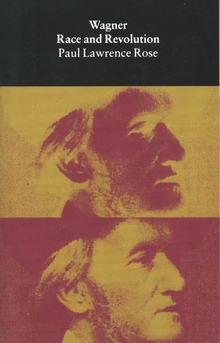Wagner
WARNING
You are viewing an older version of the Yalebooks website. Please visit out new website with more updated information and a better user experience: https://www.yalebooks.com
Race and Revolution
Paul Lawrence Rose
"A landmark in Wagner studies that will attract enormous controversy."—Barry Millington, coeditor of Wagner in Performance
"It is a good thing to have someone willing to confront not only apologists of Wagner, of whom there are far too many, but also those who have been critical of him without really appreciating what needs to be criticized. An excellent book."—"It is a good thing to have someone willing to confront not only apologists of Wagner, of whom there are far too many, but also those who have been critical of him without really appreciating what needs to be criticized. An excellent book."—Peter Gay, Sterling Professor of History, Yale University
"The theses presented by Rose are controversial, but this book is a model of meticulous research and tight argumentation."—Sheldon Kirshner, Canadian Jewish News
"Rose . . . places Wagner in the context of 19th-century German intellectual life, linking him with the antisemitism of some of that era's greatest thinkers: Fichte, Hegel, and particularly Schopenhauer. . . . This book is an important contribution to an important debate."—Choice
"The strength of Mr. Rose's study lies . . . in its close, illuminating adherence to fact and context. His indictment of the composer—and it is that—raises disturbing questions, not only on the reputation and performance of Wagner's music (the author argues powerfully and persuasively for maintaining the ban in Israel), but also concerning long cherished views of the artist as hero, and art as social pancea and ersatz religion."—Laurence Mintz, Forward
"[Rose] argues more cogently than anyone before that racialism was integral to nineteenth-century European radicalism, whether nationalist or socialist."—Norman Lebrecht, Jewish Chronicle
"Rose demonstrates how, for Wagner, racism and revolutionism need not be mutually exclusive. By examining the composer on several differnet levels—historical, biographical, and theoretical—Wagner: Race and Revolution portrays the development of Wagner's political convictions from the cosmopolitan revolutionism of Junges Deutschland to a unique brand of racial revolutionism."—Jeffrey J. Wheeler, Monatshefte
"Persuasive, if controversial. . . . Whatever one's view, Rose does throw out a number of complex moral issues, applicable far beyond the confines of Wagner studies."—Antony Bye, Musical Times
"This epoch-making study of Wagner's anti-Semitism (is) the most important work on the subject now available. . . . Scholarly studies in recent years have made it increasingly clear that the traditional separation of Wagner's art from his personal philosophy—the notion that his works are untouched either by his revolutionism or his racism—will not do. Rose's book puts the idea out of court once and for all."—Barry Millington, New Statesman & Society
"Argues that the composer's anti-Semitism was not a trivial or accidental aberration but a belief that went to the root of his whole mature revolutionary art and philosophy."—Publishers Weekly
"Rose's two books present definitive answers to serious and complex questions. The issues are eminently worth debating and Paul Lawrence Rose has contributed richly to the discussion."—Morton I. Teicher, Queens Jewish Week
"This well-researched and eminently readable book portrays a German Romantic revolutionary who made anti-Semitism an essential feature of his Weltanschauung."—Walter A. Baber, Religious Studies Review
"A pioneering and realistic study."—Connor Cruise O'Brien, Sunday Telegraph
"In this startling and original book, exploding beyond doubt all protestations to the contrary, Rose shows that Wagner was a virulent racist. . . . With admirable documentation, he goes through the operas and uncovers a musical and dramatic expression of the composer's racism. . . . For those who have read this book, Wagner's operas will never be the same again."—Tim Jackson, The Independent
"Rose's thesis is that Wagner's Jew-hatred, far from being the minor theme in his life that its apologists have made it out to be, was ferocious, ideologically systematized and central to his artistic career, and as such unique for its times. . . . Wagner's defenders have commonly sought to minimize his anti-Semitism. . . . None of these claims holds up under examination, and Rose demolishes them one by one."—Hillel Halkin, The Jerusalem Report
"No one reading Rose's book with even a half-open mind will ever again be able to listen to Wagner's later music dramas with an innocent ear."—Stewart Spencer, The Opera Quarterly
"This book is fascinating. . . . Its message is both important and compelling, and an indirect reply to those who have defended Wagner as being in no sense responsible for what came later in Hitler's Germany."—Julia Neuberger, Times Educational Supplement
Publication Date: May 29, 1996


